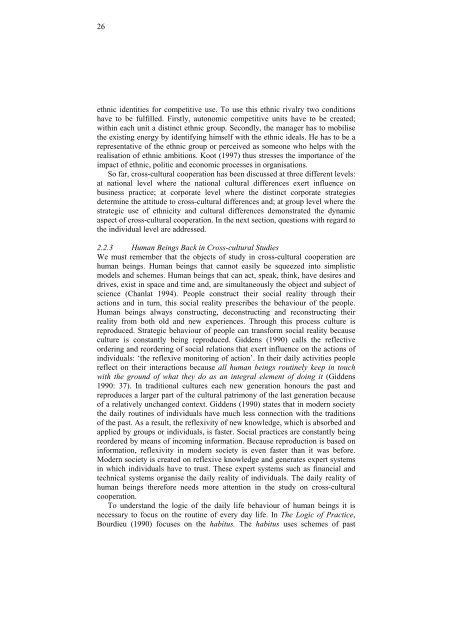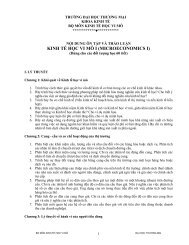The Internationalisation of PTT Telecom: A Cultural Perspective - Free
The Internationalisation of PTT Telecom: A Cultural Perspective - Free
The Internationalisation of PTT Telecom: A Cultural Perspective - Free
- No tags were found...
Create successful ePaper yourself
Turn your PDF publications into a flip-book with our unique Google optimized e-Paper software.
26ethnic identities for competitive use. To use this ethnic rivalry two conditionshave to be fulfilled. Firstly, autonomic competitive units have to be created;within each unit a distinct ethnic group. Secondly, the manager has to mobilisethe existing energy by identifying himself with the ethnic ideals. He has to be arepresentative <strong>of</strong> the ethnic group or perceived as someone who helps with therealisation <strong>of</strong> ethnic ambitions. Koot (1997) thus stresses the importance <strong>of</strong> theimpact <strong>of</strong> ethnic, politic and economic processes in organisations.So far, cross-cultural cooperation has been discussed at three different levels:at national level where the national cultural differences exert influence onbusiness practice; at corporate level where the distinct corporate strategiesdetermine the attitude to cross-cultural differences and; at group level where thestrategic use <strong>of</strong> ethnicity and cultural differences demonstrated the dynamicaspect <strong>of</strong> cross-cultural cooperation. In the next section, questions with regard tothe individual level are addressed.2.2.3 Human Beings Back in Cross-cultural StudiesWe must remember that the objects <strong>of</strong> study in cross-cultural cooperation arehuman beings. Human beings that cannot easily be squeezed into simplisticmodels and schemes. Human beings that can act, speak, think, have desires anddrives, exist in space and time and, are simultaneously the object and subject <strong>of</strong>science (Chanlat 1994). People construct their social reality through theiractions and in turn, this social reality prescribes the behaviour <strong>of</strong> the people.Human beings always constructing, deconstructing and reconstructing theirreality from both old and new experiences. Through this process culture isreproduced. Strategic behaviour <strong>of</strong> people can transform social reality becauseculture is constantly being reproduced. Giddens (1990) calls the reflectiveordering and reordering <strong>of</strong> social relations that exert influence on the actions <strong>of</strong>individuals: ‘the reflexive monitoring <strong>of</strong> action’. In their daily activities peoplereflect on their interactions because all human beings routinely keep in touchwith the ground <strong>of</strong> what they do as an integral element <strong>of</strong> doing it (Giddens1990: 37). In traditional cultures each new generation honours the past andreproduces a larger part <strong>of</strong> the cultural patrimony <strong>of</strong> the last generation because<strong>of</strong> a relatively unchanged context. Giddens (1990) states that in modern societythe daily routines <strong>of</strong> individuals have much less connection with the traditions<strong>of</strong> the past. As a result, the reflexivity <strong>of</strong> new knowledge, which is absorbed andapplied by groups or individuals, is faster. Social practices are constantly beingreordered by means <strong>of</strong> incoming information. Because reproduction is based oninformation, reflexivity in modern society is even faster than it was before.Modern society is created on reflexive knowledge and generates expert systemsin which individuals have to trust. <strong>The</strong>se expert systems such as financial andtechnical systems organise the daily reality <strong>of</strong> individuals. <strong>The</strong> daily reality <strong>of</strong>human beings therefore needs more attention in the study on cross-culturalcooperation.To understand the logic <strong>of</strong> the daily life behaviour <strong>of</strong> human beings it isnecessary to focus on the routine <strong>of</strong> every day life. In <strong>The</strong> Logic <strong>of</strong> Practice,Bourdieu (1990) focuses on the habitus. <strong>The</strong> habitus uses schemes <strong>of</strong> past




